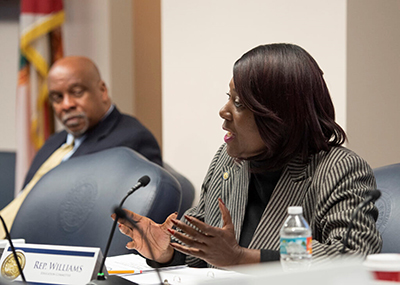By Diane Rado
Gov. Ron DeSantis has signed into law a bill that will essentially change the way Black children are portrayed and described in Florida law.
The legislation, HB 893, was one of 42 bills approved by DeSantis Wednesday evening, part of a stack of bills that the Florida Legislature passed in the 2022 legislative session.
In the case of HB 893, the bill started out about child welfare placements.
But it became a law when the Florida Legislative Black Caucus and other lawmakers became critical about racist wording in a Florida statute and moved to create more appropriate language to define Black kids from the child welfare system.
At issue was language in existing state law that defines a “special needs child” as a child “of black or racially mixed parentage.” That language doesn’t specify the race of other children.
In February, State Rep. Patricia Williams, a Democrat representing part of Broward County, pushed to take away the term “special needs child” and replace it with a “difficult to place” child. Both Republicans and Democrats came on board to make the changes.
At the time, Williams told the Florida Phoenix that the existing state law categorizing Black kids in the child welfare system as a “special needs” child “is proof that racism is still very much alive.”
The bill amended various sections of the statute by changing the term “special needs” to “difficult to place” to accurately reflect the intent as it relates to children who would benefit from adoption assistance programs. Now, that language is in the law.
Here’s the original language that caused concern by Black lawmakers and others:
DEFINITIONS. — As used in this section the term:
(a) “Special needs child” means:
1. A child whose permanent custody has been awarded to the department or to a licensed child-placing agency.
2. A child who has established significant emotional ties with his or her foster parents or is not likely to be adopted because he or she is:
a. Eight years of age or older.
b. Developmentally disabled.
c. Physically or emotionally handicapped.
d. Of black or racially mixed parentage; or
e. A member of a sibling group of any age, provided two or more members of a sibling group remain together for purposes of adoption.
This section states: “Child within the child welfare system” or “child” means a special needs child and any other child who was removed from the child’s caregiver due to abuse or neglect and whose permanent custody has been awarded to the department or to a licensed child-placing agency.
With DeSantis’ approval late Wednesday, the 16-page HB 893 bill becomes the new law, showing the changes made in various sentences. The phrase “difficult to place,” replaces the term “special needs.”
And that language starts now, because the bill says: “This act shall take effect upon becoming a law.”

